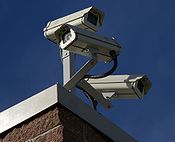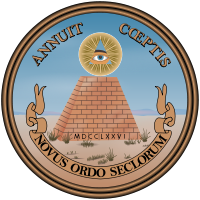
Celine's laws
Encyclopedia
Celine's Laws are a series of three laws regarding government and social interaction attributed to the fictional character Hagbard Celine
from Robert Anton Wilson's
Illuminatus! Trilogy. Celine, a gentleman anarchist
, serves as a mouthpiece for Wilson's libertarian
, anarchist and sometimes completely uncategorizable ideas about the nature of mankind. Celine's Laws are outlined in the trilogy by a manifesto titled Never Whistle While You're Pissing. Wilson later goes on to elaborate on the laws in his nonfiction book, Prometheus Rising
, as being inherent consequences of average human psychology.
A piece entitled Celine's Laws appears in Robert Anton Wilson
's The Illuminati Papers
, which features articles written by Wilson under the guise of many of his characters from the Illuminatus! Trilogy alongside interviews with the author himself. One article pulls from another, as well as from the original Trilogy.
Celine, in his manifesto, recognizes these are generalities, but also says that their basic principles can be used to find the source of every great decline and fall of nations, and goes on to claim they are as universal as Newton's Laws in applying to everything.
 National Security is the chief cause of national insecurity.
National Security is the chief cause of national insecurity.
Reflecting the paranoia of the Cold War
, Celine's First Law focuses around the common idea that to have national security, one must create a secret police
. Since internal revolutionaries and external foes would make the secret police a prime target for infiltration, and because the secret police would by necessity have vast powers to blackmail and intimidate other members of the government, another higher set of secret police must be created to monitor the secret police. And an even higher set of secret police must then be created to monitor the higher order of secret police. Repeat ad nauseam.
This seemingly infinite regress goes on until every person in the country is spying on another, or "the funding runs out." And since this paranoid and self monitoring situation inherently makes targets of a nation's own citizens, the average person in the nation is more threatened by the massive secret police complex than by whatever foe they were seeking to protect themselves from. Wilson points out that the Soviet Union
, which suffered from this in spades, got to the point that it was terrified of painters and poets who could do little harm to them in reality.
At the same time, given the limitation of funding and scale, the perfect security state never truly emerges, leaving the populace still vulnerable from the original threat while also being threatened by the vast and Orwellian
secret police.
 Accurate communication is possible only in a non-punishing situation.
Accurate communication is possible only in a non-punishing situation.
Wilson rephrases this himself many times as "communication occurs only between equals." Celine calls this law "a simple statement of the obvious" and refers to the fact that everyone who labors under an authority figure tends to lie to and flatter that authority figure in order to protect themselves either from violence or from deprivation of security (such as losing one's job). In essence, it is usually more in the interests of any worker to tell his boss what he wants to hear, not what is true.
In any hierarchy, every level below the highest carries a subtle burden to see the world in the way their superiors expect it to be seen and to provide feedback to their superiors that their superiors want to hear. In the end, any hierarchical organization supports what its leaders already think is true more than it challenges them to think differently. The levels below the leaders are more interested in keeping their jobs than telling the truth.
Wilson, in Prometheus Rising, uses the example of J. Edgar Hoover
's FBI. Hoover saw communist
infiltrators and spies everywhere, and he told his agents to hunt them down. Therefore, FBI agents began seeing and interpreting everything they could as parts of the communist conspiracy. Some even went as far as framing people as communists, making largely baseless arrests and doing everything they could to satisfy Hoover's need to find and drive out the communist conspiracy. The problem is, such a conspiracy never existed in any form. Hoover thought it did, but any agent who dared point out the lack of evidence to Hoover would be at best denied promotions, and at worst labeled a communist himself and lose his job. Any agent who knew the truth would be very careful to hide the fact.
Meanwhile, the FBI was largely ignoring the problem of organized crime (the Mafia), because Hoover insisted that organized crime did not exist on the national scale. Not only does the leader of the hierarchy see what he wants to see, but he also does not see what he does not want to see. Agents who pursued the issue of organized crime were sometimes marginalized within the organization or hounded into retirement.
In the end, Celine states, any hierarchy acts more to conceal the truth from its leaders than it serves to find the truth.
 An honest politician is a national calamity.
An honest politician is a national calamity.
Celine recognizes that the third law seems preposterous from the beginning. While a dishonest politician is interested only in bettering his own lot through abusing the public trust, an honest politician is far more dangerous since he is honestly interested in bettering society through political action, and that means writing and implementing more and more laws.
Celine argues that creating more laws simply creates more criminals. Laws inherently restrict individual freedom
, and the explosive rate at which laws are being created means that every citizen in the course of his daily life does not have the research capacity to not violate at least one of the plethora of laws. It is only through honest politicians trying to change the world through laws that true tyranny
can come into being through excessive legislation.
Corrupt politicians simply line their own pockets. Honest idealist politicians cripple the people's freedom through enormous amounts of laws. So corrupt politicians are preferable according to Celine, despite the possibility of an honest politician who honestly opposes the formation of new laws (or wants to do away with some).
Hagbard Celine
Freeman Hagbard Celine, H.M., S.H. is a central protagonist in the Illuminatus trilogy of books by Robert Shea and Robert Anton Wilson, named after the legendary Viking hero Hagbard who died for love. In the Schrödinger's Cat trilogy, the sequel to Illuminatus!, it is stated that 'Hagbard Celine'...
from Robert Anton Wilson's
Robert Anton Wilson
Robert Anton Wilson , known to friends as "Bob", was an American author and polymath who became at various times a novelist, philosopher, psychologist, essayist, editor, playwright, poet, futurist, civil libertarian and self-described agnostic mystic...
Illuminatus! Trilogy. Celine, a gentleman anarchist
Anarchism
Anarchism is generally defined as the political philosophy which holds the state to be undesirable, unnecessary, and harmful, or alternatively as opposing authority in the conduct of human relations...
, serves as a mouthpiece for Wilson's libertarian
Libertarianism
Libertarianism, in the strictest sense, is the political philosophy that holds individual liberty as the basic moral principle of society. In the broadest sense, it is any political philosophy which approximates this view...
, anarchist and sometimes completely uncategorizable ideas about the nature of mankind. Celine's Laws are outlined in the trilogy by a manifesto titled Never Whistle While You're Pissing. Wilson later goes on to elaborate on the laws in his nonfiction book, Prometheus Rising
Prometheus Rising
Prometheus Rising is a book by Robert Anton Wilson first published in 1983. It is a guide book of "how to get from here to there", an amalgam of Timothy Leary's 8-circuit model of consciousness, Gurdjieff's self-observation exercises, Alfred Korzybski's general semantics, Aleister Crowley's magical...
, as being inherent consequences of average human psychology.
A piece entitled Celine's Laws appears in Robert Anton Wilson
Robert Anton Wilson
Robert Anton Wilson , known to friends as "Bob", was an American author and polymath who became at various times a novelist, philosopher, psychologist, essayist, editor, playwright, poet, futurist, civil libertarian and self-described agnostic mystic...
's The Illuminati Papers
The Illuminati Papers
The Illuminati Papers is a collection of essays and other works by Robert Anton Wilson first published in 1980 . The book expands upon characters and themes from his earlier The Illuminatus! Trilogy and most of the essays are written from the point of view of the characters in Illuminatus! Topics...
, which features articles written by Wilson under the guise of many of his characters from the Illuminatus! Trilogy alongside interviews with the author himself. One article pulls from another, as well as from the original Trilogy.
Celine, in his manifesto, recognizes these are generalities, but also says that their basic principles can be used to find the source of every great decline and fall of nations, and goes on to claim they are as universal as Newton's Laws in applying to everything.
Celine's First Law

Reflecting the paranoia of the Cold War
Cold War
The Cold War was the continuing state from roughly 1946 to 1991 of political conflict, military tension, proxy wars, and economic competition between the Communist World—primarily the Soviet Union and its satellite states and allies—and the powers of the Western world, primarily the United States...
, Celine's First Law focuses around the common idea that to have national security, one must create a secret police
Secret police
Secret police are a police agency which operates in secrecy and beyond the law to protect the political power of an individual dictator or an authoritarian political regime....
. Since internal revolutionaries and external foes would make the secret police a prime target for infiltration, and because the secret police would by necessity have vast powers to blackmail and intimidate other members of the government, another higher set of secret police must be created to monitor the secret police. And an even higher set of secret police must then be created to monitor the higher order of secret police. Repeat ad nauseam.
This seemingly infinite regress goes on until every person in the country is spying on another, or "the funding runs out." And since this paranoid and self monitoring situation inherently makes targets of a nation's own citizens, the average person in the nation is more threatened by the massive secret police complex than by whatever foe they were seeking to protect themselves from. Wilson points out that the Soviet Union
Soviet Union
The Soviet Union , officially the Union of Soviet Socialist Republics , was a constitutionally socialist state that existed in Eurasia between 1922 and 1991....
, which suffered from this in spades, got to the point that it was terrified of painters and poets who could do little harm to them in reality.
At the same time, given the limitation of funding and scale, the perfect security state never truly emerges, leaving the populace still vulnerable from the original threat while also being threatened by the vast and Orwellian
Orwellian
"Orwellian" describes the situation, idea, or societal condition that George Orwell identified as being destructive to the welfare of a free society...
secret police.
Celine's Second Law

Wilson rephrases this himself many times as "communication occurs only between equals." Celine calls this law "a simple statement of the obvious" and refers to the fact that everyone who labors under an authority figure tends to lie to and flatter that authority figure in order to protect themselves either from violence or from deprivation of security (such as losing one's job). In essence, it is usually more in the interests of any worker to tell his boss what he wants to hear, not what is true.
In any hierarchy, every level below the highest carries a subtle burden to see the world in the way their superiors expect it to be seen and to provide feedback to their superiors that their superiors want to hear. In the end, any hierarchical organization supports what its leaders already think is true more than it challenges them to think differently. The levels below the leaders are more interested in keeping their jobs than telling the truth.
Wilson, in Prometheus Rising, uses the example of J. Edgar Hoover
J. Edgar Hoover
John Edgar Hoover was the first Director of the Federal Bureau of Investigation of the United States. Appointed director of the Bureau of Investigation—predecessor to the FBI—in 1924, he was instrumental in founding the FBI in 1935, where he remained director until his death in 1972...
's FBI. Hoover saw communist
Communism
Communism is a social, political and economic ideology that aims at the establishment of a classless, moneyless, revolutionary and stateless socialist society structured upon common ownership of the means of production...
infiltrators and spies everywhere, and he told his agents to hunt them down. Therefore, FBI agents began seeing and interpreting everything they could as parts of the communist conspiracy. Some even went as far as framing people as communists, making largely baseless arrests and doing everything they could to satisfy Hoover's need to find and drive out the communist conspiracy. The problem is, such a conspiracy never existed in any form. Hoover thought it did, but any agent who dared point out the lack of evidence to Hoover would be at best denied promotions, and at worst labeled a communist himself and lose his job. Any agent who knew the truth would be very careful to hide the fact.
Meanwhile, the FBI was largely ignoring the problem of organized crime (the Mafia), because Hoover insisted that organized crime did not exist on the national scale. Not only does the leader of the hierarchy see what he wants to see, but he also does not see what he does not want to see. Agents who pursued the issue of organized crime were sometimes marginalized within the organization or hounded into retirement.
In the end, Celine states, any hierarchy acts more to conceal the truth from its leaders than it serves to find the truth.
Celine's Third Law

Celine recognizes that the third law seems preposterous from the beginning. While a dishonest politician is interested only in bettering his own lot through abusing the public trust, an honest politician is far more dangerous since he is honestly interested in bettering society through political action, and that means writing and implementing more and more laws.
Celine argues that creating more laws simply creates more criminals. Laws inherently restrict individual freedom
Freedom (political)
Political freedom is a central philosophy in Western history and political thought, and one of the most important features of democratic societies...
, and the explosive rate at which laws are being created means that every citizen in the course of his daily life does not have the research capacity to not violate at least one of the plethora of laws. It is only through honest politicians trying to change the world through laws that true tyranny
Tyrant
A tyrant was originally one who illegally seized and controlled a governmental power in a polis. Tyrants were a group of individuals who took over many Greek poleis during the uprising of the middle classes in the sixth and seventh centuries BC, ousting the aristocratic governments.Plato and...
can come into being through excessive legislation.
Corrupt politicians simply line their own pockets. Honest idealist politicians cripple the people's freedom through enormous amounts of laws. So corrupt politicians are preferable according to Celine, despite the possibility of an honest politician who honestly opposes the formation of new laws (or wants to do away with some).

